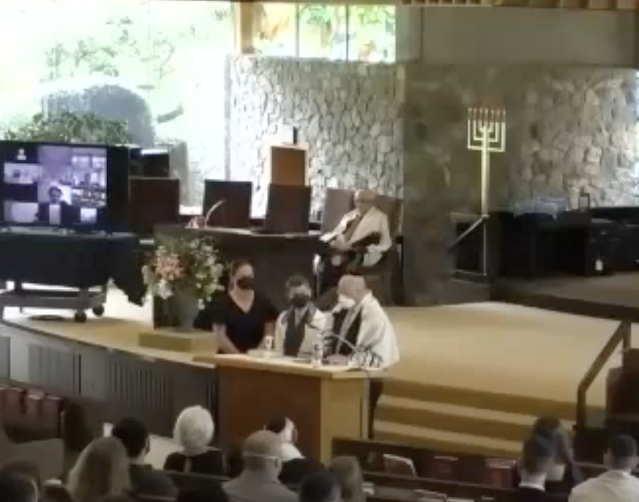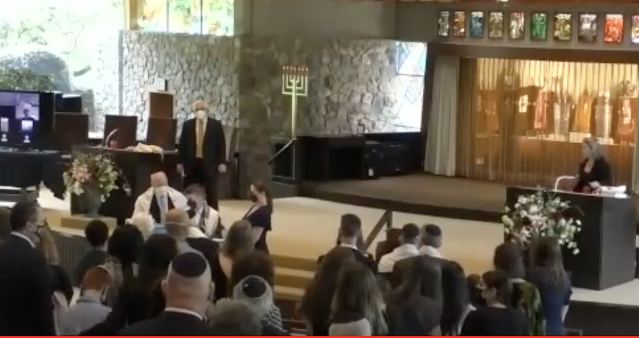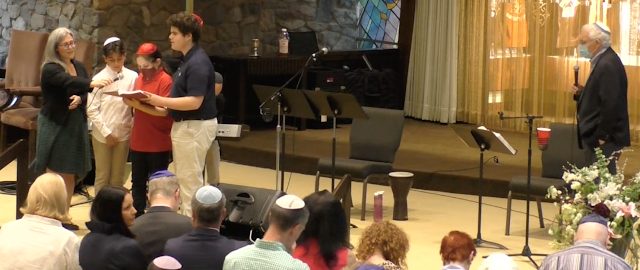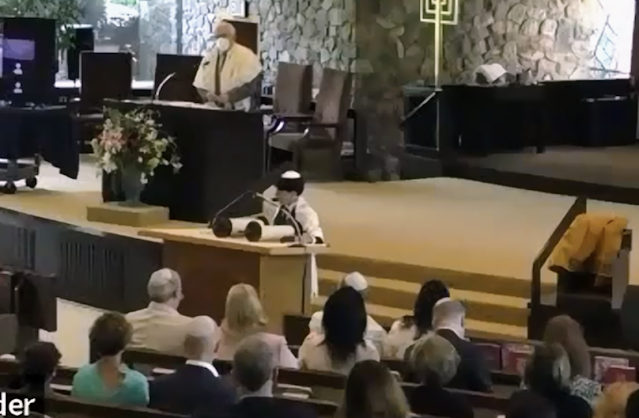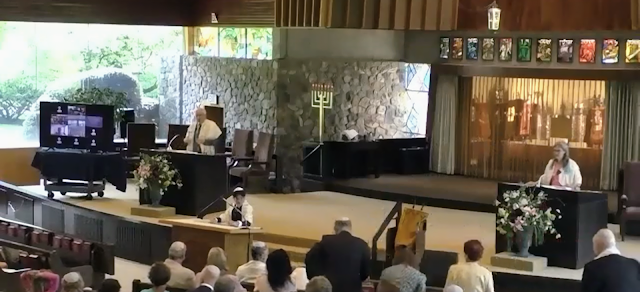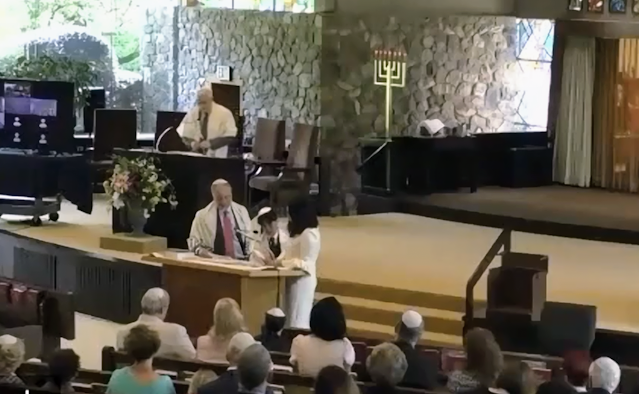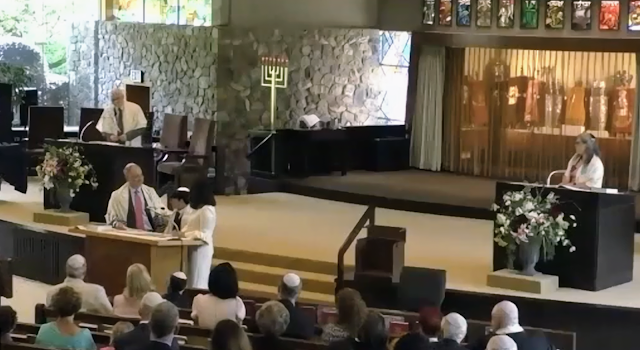Author of "Embracing Auschwitz" and "Mensch•Marks: Life Lessons of a Human Rabbi - Wisdom for Untethered Times." Winner of the Rockower Award, the highest honor in Jewish journalism and 2019 Religion News Association Award for Excellence in Commentary. Musings of a rabbi, journalist, father, husband, poodle-owner, Red Sox fan and self-proclaimed mensch, taken from essays, columns, sermons and thin air. Writes regularly in the New York Jewish Week and Times of Israel.
Monday, May 30, 2022
TBE Bar/Bat Mitzvah Commentary: Benjamin Winarsky on Bechukotai (dvar Torah, video and screen grabs)
Zoom Video of the Service, May 28, 2022
Shabbat Shalom.
Thank you to everyone who came to my Bar Mitzvah today.
In my torah portion, Bechukotai, G-d promises that if the Jews keep his commandments, they will thrive in the land of Israel. But, if the Jews do not follow them, they will suffer. G-d lists the different scenarios if the Jews follow the right path … or not. If they keep the commandments, they will get rain for crops, be evenly fed, and will win all battles. If the Jews don’t keep the commandments, they will be ruled by people they hate, lose in all battles, wild animals will steal their children and cattle, and they will be petrified from the sound of a falling leaf which will send them running in the other direction. That sounds pretty bad to me! This demonstrates that G-d gives the choice to the Jewish people and allows them to choose their destiny. Finally, this parsha says when G-d gets angry with the Jewish people and punishes them, he will never abandon them and forgive them over time.
This portion makes me think about the choices I often have to make in life. I can follow the rules and be rewarded, (or at least not punished), or, I can break the rules and suffer the consequences. Either way, I know my parents will still love me, not abandon me, and forgive me over time. One time that I did not follow the rules was when I got lost in the woods while skiing 4 years ago. I was in Vermont with my family and another family, and I decided not to follow my dad and sister on the trail, but to follow my friends. When you are skiing, there are little pop outs where you could go off of the trail, do a jump, and keep going on your ski run. But this pop out was very different! As we skied down there was a tree that had fallen and blocked the path. We had to unclip our skis and throw them over a tree, climb over it, and then had to keep going. Once we saw light through the trees, we thought we were fine. But when we got to the edge, there was a small cliff. Luckily, there were 2 adult snowboarders that saw three kids and decided to stop and help us. The snowboarders basically dangled us over the cliff with our skis so that we could get down. We had been missing for a long time and our parents were skiing all over the mountain searching for us. We finally got back on a trail and my dad and sister were waiting for me. In this scenario, I could have not gone on that pop out and followed the rules by staying on the trail. But instead, I didn’t follow the rules and basically got lost and was super scared. After what happened, my parents were annoyed that I didn’t stay on the “right track” and made them worried, but they still love me and forgave me, just like how G-d will always love and forgive the Jews even if they do not follow his rules.
From this incident, I have come to understand that G-d wasn’t punishing the people of Israel at all, just showing them the consequences of their own actions. Just like my parents didn’t need to punish me after I skied on the wrong trail, thank you for not punishing me, I learned my lesson as a result of my own actions. Some people say the punishment fits the crime, but my portion is telling me that the punishment is the natural result of the crime.
My mitzvah project is “Bringing Bricks to Stamford Hospital” where I will be donating Lego and Duplo sets to David’s Treasure Chest Toy Closet in the pediatric unit of Stamford Hospital. All children admitted to the hospital are able to choose a gift from the Toy Closet and I would like Legos and Duplos to be available. The reason I chose this as my project is largely based on my love of Legos. Everyone who really knows me knows that I have a passion for collecting and building with Legos. I have spent countless hours of my childhood surrounded by bricks and Lego Minifigures. I hope children at Stamford Hospital will be able to experience the same excitement and joy of building their own Lego sets as I do. If people still would like to donate a Lego or Duplo set, I will be collecting them for the next couple of weeks.
Thursday, May 26, 2022
In this Moment, May 27 - Murder-Rinse-Repeat; the Most Gruesome Verse in the Bible; "The Netanyahus" Wins a Pulitzer; The Highest and Purest Democracy
|
Wednesday, May 25, 2022
Selections from Pulitzer Prize Winning Novel, "The Netanyahus: An Account of a Minor and Ultimately Even Negligible Episode in the History of a Very Famous Family"
I read "The Netanyahus" last year and immediately was taken by Joshua Cohen's spot on take on the growing mid-century fissure between American Jews and Israelis. Aside from that, it is hilarious. And now it has won the Pulitzer, putting Cohen up on the level of Roth, Bellow, Chabon and Malamud - and making this book, which was rejected by over 20 publishers, a must-read for American Jews. I've highlighted some of my favorite passages. Click here for the NYT review. Click here for the Ha'aretz podcast interview.
A decade: the lifespan of a salamander; the time it took for the Flavian‘s to put up the Colosseum in for Odysseus to make it back to Ithaca;… Just about a decade prior to the autumn I’m recalling, the state of Israel was founded. In that minuscule country halfway across the globe, displaced and refugee Jews were busy reinventing themselves into a single people, united by the hatred and subjugation of contrary regimes, in a mass process of solidarity aroused by gross antagonism. Simultaneously, a kindred mass process was occurring here in America, where Jews were busy being de-invented , or uninvented, or assimilated, by democracy and market forces, intermarriage and miscegenation. Regardless of where they were and the specific nature and direction of the process, however, it remains an incontrovertible fact that nearly all the worlds Jews were involved in mid century and becoming something else; and at this point of transformation, the old internal differences between them – a former citizenship and class, to say nothing of language in degree of religious observance - became for a brief moment more palpable than ever, giving one last death rattle gasp. (P.51)
Dr. Netanyahu was a believer, and if there was any distinction at all between what he believed and what the rabbis did, it was that Dr. Netanyahu preferred to attribute the power of change not to a deity acting in accordance with an inscrutable design to the worlds best stock of Gentiles who acted out of hatred, constantly judging the Jews and pressing them, and affecting change through their oppression: converting them, and converting them, massacring and expelling. This is how Dr. Netanyahu was able to pass off a theology as history, by the vesting the divine of its responsibility for change and assigning it instead to mortals… (P.41)
The
history of Zionism is so difficult to recount, and all attempts evanescence into
metaphysics. Socialists, communist, anarchist, Zionists – think of how many
identities Jews had to assume over the course of the modern era only in order
to be what they were, to be Jews again… But this time to be Jews freely… (P.81)
As
the Netanyahu kids are mesmerized watching their host’s brand new TV in 1960,
Benjamin, sitting Leaugust said without tearing his snake-eyed gaze from the screen,
that he wanted to watch Bonanza.
Benzion Netanyahu gives a lecture toward the end of the book, detailing his take on Jewish history.
“When it came to chronicling Jewish life, what difference could there be between Rome and Greece and Babylon? Were they all just ultimately variations on Egyptian bondage, and all of their rulers essentially incarnations of the Pharaoh? Through this process of repeatedly relating the Bible to the present, history was negated; the more the stories were repeated – every weekly recurrence of the Sabbath, every annual recurrence of a holiday – the more the past was brought into the present until the present and past were essentially collapsed and each next year was rendered identical to the last, with all occurrences made contemporary. This collapsing of time in part of a certain messianic quality both to the daily lives of individual Jews and to the collective spiritual life of the Jewish people. In other words, through interpretation these preservers of God‘s word were preserved themselves. Take, for instance, Zion, a historical kingdom that in its destruction was transmuted into myths, becoming in the Diaspora a story and poetic trope that reign supreme in the Jewish imagination for millennia. The world is full of real events, real things, which have been lost in their destruction and are only remembered as having existed in written history. Because it was remembered not as written history but as interpretable story was able to exist again in actuality, with the founding of the modern state of Israel. With the establishment of Israel, the poetic was returned to the practical. This is the first example ever in human civilization in which this happened – in which a story became real; it became a real country with a real army, real essential services, real treaties and real trade pacts, real supply chains and real sewage. Now that Israel exists, however, the days of the Bible tales are finished and the true history of my people can finally begin and if any Jewish question remains to be answered it’s whether my people have the ability or appetite to tell the difference.” (P171)
You, Ruben Blum, are out of history; you’re over and
finished; and only a generation or to the memory of who your people were will
be dead, and America won’t give your unrecognizable descendants anything real
with which to replace the sense of peoplehood it took from them; cut…. Your
life here is rich in possessions but poor in spirit, petty and forgivable, with
your Frigidaires and color TVs, in front of which you can munch your instant
supper, laugh at the joke, and choke, realizing that you have traded your birth
right away for a bowl of plastic lentils… (P212)
Sunday, May 22, 2022
TBE Bar/Bat Mitzvah Commentary: Jacob Lederman on Behar, plus video and screen grabs
Shabbat Shalom!
My portion of Behar includes the idea of the Sabbatical or Shmita year, which is a time of rest for the workers and for the land itself. Just as with the Shabbat day every week, the Torah feels that it’s important to be able to take a break to renew our energy.
But… there was one person who never took a day off… at least before his retirement, who even wrote a book called “Relentless.” And he is my hero – in fact, he is my Jewish hero. And it doesn’t hurt that I’m also a Patriots fan – as he was a career Patriot.
Julian Edelman never took a day off until he retired due to a knee injury. He has taught us that even someone relentless also needs to rest, just like the land of Israel, and everyone else on this planet except for one person… Tom Brady, who will never go away. It’s time to retire, Tom!
I met Edelman once. I went to one of his football camps. He treated us so well, like he knew everyone forever. I played catch, I got his autograph and took a few pictures. It will be a day I remember forever.
I admire him because we have a lot of similarities. We’re built about the same, not so big, not naturally athletic, and Football is something we’ve both had to work hard at. Like him, I play wide receiver, and like him, I’ve played quarterback too. We’ve also faced some similar challenges off the field, like coming to grips with our Jewish identity.
In his book “Relentless,” he teaches how to overcome challenges and be the best “me.” For Edelman, being Jewish has become a major part of his life, and a part of his best “me.”
Edelman tweets about his Jewish journey often, he has worn an Israeli flag pin on the field, gone on a Birthright-style trip to Israel, and he has written a children’s book that includes a reference to Theodor Herzl, the founder of modern Zionism. He makes himself available to other athletes and educates them on Judaism and antisemitism. In March 2021, Edelman reached out to Miami Heat player Meyers Leonard after he used an antisemitic slur during a livestream video. In my Torah portion it states that we should not oppress our neighbor – it says this twice, therefore commentators determined that one time it means not to oppress our neighbor with words, which relates to this situation. This is the lesson he taught Meyers Leonard. Edelman took things one step further and introduced Leonard to Judaism by inviting him to Shabbat dinner, something my parents have done often inviting my friends over for Shabbat and holidays. Edelman also did the same for wide receiver Deshawn Jackson when he used an anti-Semitic quote.
When it comes to being proud of his Jewish faith Edelman never takes a Sabbatical. In fact, on the day he retired, he released a video announcing his retirement while wearing a star of David. Furthermore, after the Tree of Life synagogue shooting in 2018 that killed 11 people, Edelman wore special cleats with Hebrew literature on them to honor the victims. He also continued to tweet: “My heart is broken for the families in Pittsburgh. It’s hard to even imagine such senselessness. As a Jew, an American and a human, I’m devastated.”
Edelman is also now studying to become bar mitzvah. So, I could possibly give back to him, and inspire him to complete this tall task.
Just like Edelman, I like to pay it forward, and help those less fortunate. For my Mitzvah Project, I collected cleaning supplies for the Open Door Shelter in my hometown of Norwalk. The Open Door Shelter helps homeless families move into new homes. The cleaning kits I collected are given to every family so they have basic cleaning supplies to start off with. I did this because it is something that I see in my everyday life, as my mom has taught me and my brother how important it is to keep a house clean.




